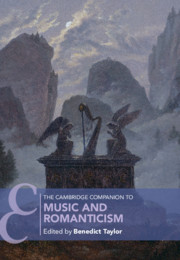Book contents
- The Cambridge Companion to Music and Romanticism
- Cambridge Companions to Music
- The Cambridge Companion to Music and Romanticism
- Copyright page
- Contents
- Figures
- Tables
- Musical Examples
- Contributors
- Preface
- Chronology
- Part I Horizons
- Part II Worlds
- 3 Music and Romantic Literature
- 4 Music, Romantic Landscape, and the Visual
- 5 Romanticism, the Folk, and Musical Nationalisms
- 6 Music, Romanticism, and Politics
- 7 Music and Technology
- 8 Music, Magic, and the Supernatural
- 9 A Kingdom Not of This World: Music, Religion, Art-Religion
- Part III Aesthetics
- Part IV Practices
- Part V Histories
- Select Bibliography
- Index
- References
8 - Music, Magic, and the Supernatural
from Part II - Worlds
Published online by Cambridge University Press: 06 August 2021
- The Cambridge Companion to Music and Romanticism
- Cambridge Companions to Music
- The Cambridge Companion to Music and Romanticism
- Copyright page
- Contents
- Figures
- Tables
- Musical Examples
- Contributors
- Preface
- Chronology
- Part I Horizons
- Part II Worlds
- 3 Music and Romantic Literature
- 4 Music, Romantic Landscape, and the Visual
- 5 Romanticism, the Folk, and Musical Nationalisms
- 6 Music, Romanticism, and Politics
- 7 Music and Technology
- 8 Music, Magic, and the Supernatural
- 9 A Kingdom Not of This World: Music, Religion, Art-Religion
- Part III Aesthetics
- Part IV Practices
- Part V Histories
- Select Bibliography
- Index
- References
Summary
At the heart of Romantic supernaturalism was a newly ‘real’ or ‘material’ magic described by philosophers and aesthetic theorists including Friedrich Schlegel, E. T. A. Hoffmann, Théophile Gautier, Charles Nodier, and others. Rejecting the illusory marvels of the eighteenth century and recalling aspects of natural magic associated with Renaissance cosmology, Romantic fantasy reconciled science and enchantment, phenomena and noumena. This chapter explores how such a reconciliation happened, outlining the impact of post-Kantian Idealist thought, the role of pantheism, the social shifts initiated by eighteenth-century revolutionary and imperialist activity, and the emergence of Gothic culture. From these developments, a new magical mode emerged – a fantastic epistemology – with special implications for music. It allowed fairies to converge with insects, demons to merge into colonial Others, and supernatural spirits to enter the domain of the real. These ideas are fleshed out via close readings of Schubert’s Erlkönig, Mendelssohn’s Overture to A Midsummer Night’s Dream, and Meyerbeer’s Robert le diable.
- Type
- Chapter
- Information
- The Cambridge Companion to Music and Romanticism , pp. 127 - 145Publisher: Cambridge University PressPrint publication year: 2021



